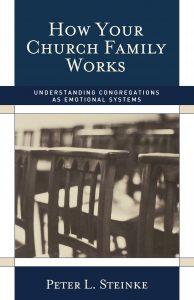This is probably the most significant leadership book I have read. Peter Steinke presents pastoral leadership in terms of promoting healing in the congregation. The primary dis-ease of congregations is anxiety. Most pastors treat only the symptoms.
To place this in a Pentecostal context, the pastor’s responsibility is the sanctification of God’s people. Paul spoke of presenting the church to Christ as a virgin bride. If the task of Pentecostal pastoral leadership is the sanctification of the bride of Christ, then the Pentecostal pastor must understand that his/her task is to struggle with the people of God.
Using systems theory Steinke helps us to understand that congregations are communities. In the Christian community, all relationships are mutually influenced. Often, in these communities, the most influential persons may be the most destructive. Relationships may be defined as a series of triangles. The triangle may be defined as a relationship between God, the pastor and the member. Or, the triangle may consist of a choir leader, the pastor, and a choir member. And, all relationships are influenced by a multiplicity of other triangles. In these relationship triangles, responsibility must be redefined. Persons must be differentiated and responsibility is defined in terms of how one will respond within the triangle. To use a biblical metaphor, each member of the triangle is a brother’s (or sister’s) keeper.
Pastoral leadership can often be defined as anxiety management within the congregation. Steinke points out that churches are often breeding grounds for anxious behavior. In an effort to “keep the peace” many members of the church are likely to “turn the other cheek” when dealing with angry, anxious persons. This has the effect of reinforcing dysfunctional behavior in the congregation. Steinke says that pastors must move beyond this dysfunction. Families, and churches, have restorative powers.
Pastoral leadership must be prophetic. In this context, to be prophetic means to share the pain of the congregation. Many congregations, and pastors, prefer to ignore the dysfunctional relationships within the church because they have a low threshold for pain. They seek immediate relief. However, prophetic leadership understands that immediate relief is not possible. Prophets speak for God, but live with God’s people. And, prophets must be prepared to become the target of the people’s anger and anxiety.
I have found Steinke’s book very helpful in understanding why people leave a local church. People leave the church because of anxiety provoking events. In these situations the church is no longer a sanctuary of care, but a source of great anxiety. Such anxiety provoking events may be real or imagined, but they are painful just the same. In a congregation that has suffered a series of anxiety provoking events, anxiety often becomes chronic. And, the anxiety is shared and expressed throughout all triangulated relationships. Anxiety is always a symptom of a deeper problem.
In seeking to minister to these families and individuals, the wise pastor must learn to recognize the cries for help. Sometimes these cries are verbal. But most often these cries are expressed as non-verbal communication. For example, a family that was once very involved in the ministry of the Church becomes distant. Or, a faithful ministry leader suddenly resigns her position. Often, a lack in giving can signal anxiety within the relationship.
Some years ago, a colleague was leading a church through a building program. The church had borrowed hundreds of thousands of dollars to renovate their facilities. This pastor had taken it upon himself to purchase the most expensive and sophisticated audiovisual equipment available. One day as he was giving me a tour of the renovated facilities a few of the church families came for a visit. As he demonstrated the new equipment, the most asked question was “How much did that cost?” I realized that he was not hearing their question correctly. He did not hear the anxiety in their question. Later, I politely suggested that he needed to revisit the conversation with his members. He laughed and ignored my suggestion. Within six weeks he was no longer pastor of the church. The extensive renovations and the newly incurred debt were manageable points of anxiety. But due to his lack of discernment, or unwillingness to listen, the anxiety became chronic throughout the congregation. The congregation lost confidence in his abilities to properly manage their resources. With his resignation many of the newer families in the church left. Also, this young pastor left the ministry. The last time we spoke his anxiety was expressed in resentment and anger. In his zeal to lead the church in a new direction he failed to lead the church as a differentiated, non-anxious presence. This tragic failure is all too common. If pastors fail to manage congregational anxiety, they inadvertently contribute to congregational dysfunction.

